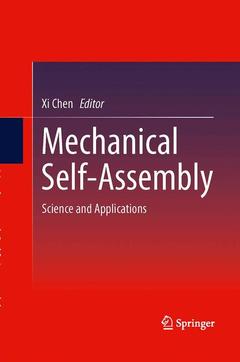Description
Mechanical Self-Assembly, Softcover reprint of the original 1st ed. 2013
Science and Applications
Coordinator: Chen Xi
Language: English
Subjects for Mechanical Self-Assembly:
Publication date: 08-2016
Support: Print on demand
Publication date: 12-2012
206 p. · 15.5x23.5 cm · Paperback
Description
/li>Contents
/li>Biography
/li>Comment
/li>
Mechanical Self-Assembly: Science and Applications introduces a novel category of self-assembly driven by mechanical forces. This book discusses self-assembly in various types of small material structures including thin films, surfaces, and micro- and nano-wires, as well as the practice's potential application in micro and nanoelectronics, MEMS/NEMS, and biomedical engineering. The mechanical self-assembly process is inherently quick, simple, and cost-effective, as well as accessible to a large number of materials, such as curved surfaces for forming three-dimensional small structures. Mechanical self-assembly is complementary to, and sometimes offer advantages over, the traditional micro- and nano-fabrication.
Presents a highly original aspect of the science of self-assembly
Describes the novel methods of mechanical assembly used to fabricate a variety of new three-dimensional material structures in simple and cost-effective ways
Provides simple insights to a number of biological systems and processes
Elucidates underlying mechanics principles of spontaneous pattern formations
Includes supplementary material: sn.pub/extras




